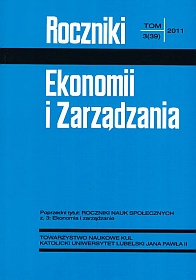Greece - a country that is too big to collapse? An analysis of the situation of public finances in the PIIGS countries and of its effect on the monetary market
Abstract
The aim of the present article is to present the convergence criteria contained in the Treaty of Maastricht and the degree to which it has been actually observed by the countries belonging to the Euro zone in the last two decades. Also, it tries to give an answer to the question concerning the rapid moves on the monetary market (with the indication to the EUR/USD ratio) in the context of the discussed problems of excessive debts incurred by the south European countries. In their analysis the authors pay special attention to Greece.
References
Finanse, red. J. Ostaszewski, Warszawa: Centrum Doradztwa i Informacji Difin 2008
Jajuga K., Zarządzanie ryzykiem, Warszawa: Wydawnictwo Naukowe PWN 2007.
Łon E., Dlaczego Polska nie powinna wchodzić do strefy euro?, Poznań : Akademia Ekonomiczna 2007, s. 7.
Markiewicz M., Siwińska J., Wydatki sztywne budz0etu państwa. Studia i analizy, Warszawa: CeDeWu 2003.
Skarżyński R., Polityka budżetowa w krajach kapitalistycznych, Warszawa 1987.
Sytuacja gospodarcza w Grecji, Hiszpanii, Irlandii, Islandii, Estonii, na Litwie i Łotwie oraz w Polsce – skutki kryzysu, Biuro Analiz Sejmowych, Warszawa 2010.
Tchorek G., Konwergencja nominalna a integracja rynków finansowych Hiszpanii, Portugalii i Grecji na drodze do strefy euro, Warszawa: Uniwersytet Warszawski 2009.
Wiśniewski P., Kryzys w strefie euro, „Infos” 2010, nr 7(77).
Copyright (c) 2011 Roczniki Ekonomii i Zarządzania

This work is licensed under a Creative Commons Attribution-NonCommercial-NoDerivatives 4.0 International License.


